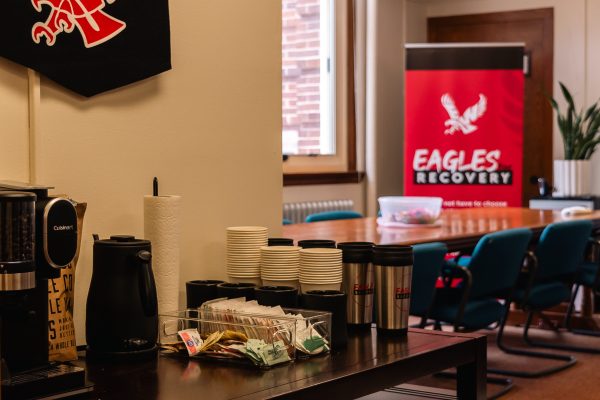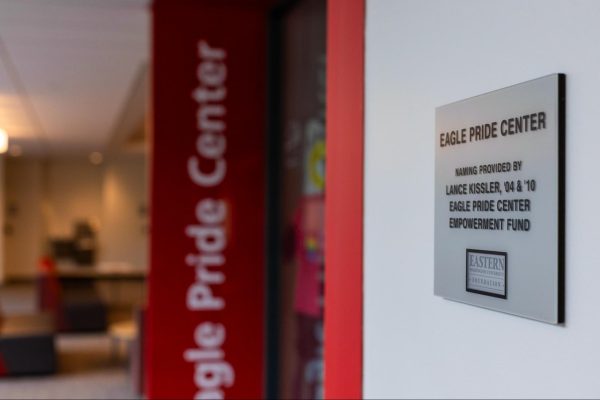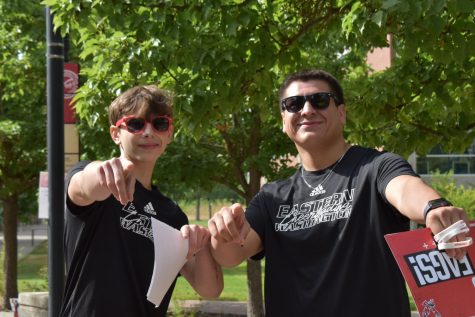Health apps contain pros and cons for student use
November 14, 2014
While health apps can offer a lot of helpful information, it is important to know what you’re goals are before you download an app otherwise the information could overwhelm its users, said Tricia Hughes, director of health, wellness and prevention services.
Health apps can be downloaded through an app store on a smart phone. These apps help users track many things including sleep patterns, calories, exercise or nutritional facts.
Hughes said health apps have a lot of very useful information, but if one’s goals are not known before trying fitness apps, the information could scare them off.
“If people are starting with nothing and they’re trying to do everything, the research shows that they’re not going to be very successful,” said Hughes.
Hughes said that if people download an app they should take small steps in improving their lifestyle. She said taking a small step in one category such as exercise one week and then adding another small step from another category the next week would be easier.
“Otherwise [people will] try too many new things at once and it just because overwhelming,” said Hughes.
Wendy Repovich, EWU program director for exercise science, said she uses her Fitbit watch and app to track her daily goals. She said her favorite part about the watch is that when she reaches her daily goals the watch “celebrates” with lights and vibration.
If someone knows their goals, Hughes said an app can be a great resource for anyone wanting to lose weight, maintain a healthy lifestyle or train for a marathon.
“I have several health applications on my phone. … Of those, the only one that I have had any consistency with using is Lose It,” said Hughes. “For me, I don’t have to use them forever, but if I take a week and I enter all of my nutrition information into it for a week it really allows me to see if I am on track for where I need to be.”
One app that has a lot to offer is Fitbit, which can be used with or without a Fitbit watch. According to the Fitbit website, users receive information on sleep patterns, exercise intensity, distance walked in a day and nutritional facts. Fitbit’s newest product is the Surge.
According to the Fitbit website, the Surge is the “ultimate fitness super watch.” This watch monitors walking, running, sleeping patterns and can notify users when someone is calling or texting them when connected to their phone. The built in GPS monitors location to determine hills and elevation to be more accurate for calorie burning.
The Fitbit watch can be used with the app, or the app can also be used at the basic level if users do not have the watch. The watch offers more information and automatically syncs the data it tracks, stated the Fitbit website.
“The thing that is nice about a fitness tracker is, as far as the activities side goes, you don’t have to do much. It kind of tracks based on your heart rate, level activity. … It’s time management,” said Hughes.
Hughes said that the most beneficial part of Fitbit for a college campus is its sleep tracking feature.
“I think at this age group in college, one of the big issues is sleep. So those gadgets that track your sleep I think can provide a student with a lot of really good information that they can use to improve their sleep cycle which benefits their overall health in a lot of different ways,” said Hughes.
Repovich said that the sleep tracker is one of the best features. She said she used to track her sleep a lot, but when she realized she was consistent, she stopped tracking it.
Nudge is an app that connects users’ other fitness apps. When one downloads Nudge, it asks to sync with existing apps. Once the app is synced, users have all of their information from their other apps in one place.
After the information from other apps has been synced with Nudge, the user receives a number from 1-110, according to the Nudge website. This number is their healthy living rate. Users with a higher number are living a healthier lifestyle.
This app gives users the ease of simplicity. This way if users have one app for fitness and one for nutrition, they do not have to try to link them themselves. Nudge sees both the fitness and the meals the user has had and gives a score based on both.
According to the Google Play Store, 10,000 people have downloaded the Nudge, and 1 million people have downloaded Fitbit.
Repovich said Fitbit is helping her be accountable for her daily goals. She sets her goals and then wears the watch, and if she meets the goal her watch tells her by lighting up and vibrating.
“You know by the end of the day whether you met your goal or not. You can’t ignore that it hasn’t celebrated for you,” said Rwepovich.
Hughes said that while these apps can be helpful and have the added benefit of tracking nearly everything, people do not need them to be successful with their goals if they are determined.
“A lot of people have shown success with just a pedometer. … If you can get to 10,000 steps you’re getting about five miles in per day, and that’s been shown to have success in weight loss,” said Hughes.


















